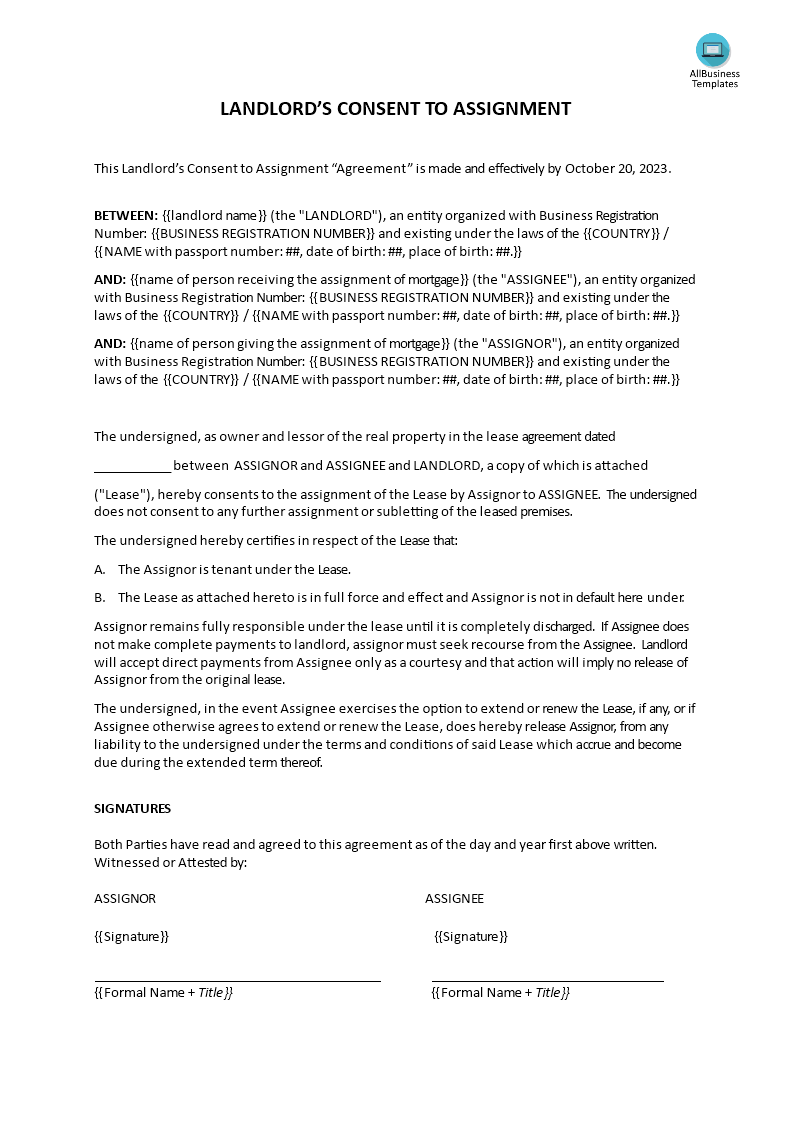Landlords Consent to Assignment
Save, fill-In The Blanks, Print, Done!

Download Landlords Consent to Assignment
Today: USD 2.99
Download It Now

Available premium file formats:
Microsoft Word (.docx)- This Document Has Been Certified by a Professional
- 100% customizable
- This is a digital download (26.57 kB)
- Language: English
- You will receive a link to download the file as soon as your payment goes through.
- We recommend downloading this file onto your computer.
Do you need a
Landlord's Consent to Assignment? What is consent to the assignment? Our template provides a comprehensive document that covers all the necessary information you need for your landlord's consent. Save time with our template and get your landlord's consent quickly and easily. Download our sample template now!
A landlord's consent to assignment, also known as a consent to assignment of lease, is a legal document that a landlord provides to a tenant when the tenant wishes to assign their lease to another party, known as the assignee or subtenant. This document serves as the landlord's formal agreement to allow the tenant to transfer their rights and responsibilities under the existing lease to the assignee. It outlines the terms and conditions under which the assignment is approved.
Here are the key elements typically found in a landlord's consent to assignment:
- Tenant Information: The document should identify the current tenant (assignor) by name and provide their contact information, including the address of the leased premises.
- Assignee Information: Include the name and contact details of the proposed assignee (subtenant) who wishes to assume the lease.
- Lease Details: Specify the details of the existing lease, such as the lease start date, lease term, and the address of the leased property.
- Reason for Assignment: The tenant should provide a brief explanation of why they wish to assign the lease. Common reasons include relocation, business expansion, or the need to downsize.
- Terms and Conditions of Assignment: Outline the terms and conditions of the assignment. This may include:
- The effective date of the assignment.
- Any restrictions or limitations on the assignee's use of the premises.
- The assignee's responsibility for rent and other lease obligations.
- The tenant's ongoing liability under the lease, is often referred to as "guarantor" or "surety" clauses.
- Any required security deposits or fees from the assignee.
- A statement indicating that the tenant will not be released from their obligations under the lease until the assignee fulfills their obligations.
- Landlord's Consent: The landlord should explicitly state their consent to the assignment and confirm that they have reviewed and approved the terms of the assignment.
- Tenant's Release: Include a statement that, upon the assignment becoming effective, the tenant is released from all obligations and liabilities under the lease, except those explicitly mentioned in the consent document.
- Tenant's Signature: The tenant should sign and date the document to indicate their agreement with the terms and their request for the landlord's consent.
- Landlord's Signature: The landlord or their authorized representative should also sign and date the document to indicate their consent.
Once all parties have signed the Landlord's Consent to Assignment, it becomes a legally binding agreement. The tenant is typically responsible for providing a copy of the consent document to both the landlord and the assignee.
Download this professional
Landlord's Consent to Assignment template now!
For more business templates? Just browse
through our database and website! You will have instant access to thousands of
free and premium business templates, legal agreements, documents, forms,
letters, reports, plans, resumes, etc., which are all used by professionals in
your industry. All business templates are ready-made, easy to find, wisely
structured, and intuitive.
DISCLAIMER
Nothing on this site shall be considered legal advice and no attorney-client relationship is established.
Leave a Reply. If you have any questions or remarks, feel free to post them below.
Related templates
Latest templates
Latest topics
- GDPR Compliance Templates
What do you need to become GDPR compliant? Are you looking for useful GDPR document templates to make you compliant? All these compliance documents will be available to download instantly... - Google Docs Templates
How to create documents in Google Docs? We provide Google Docs compatible template and these are the reasons why it's useful to work with Google Docs... - IT Security Standards Kit
What are IT Security Standards? Check out our collection of this newly updated IT Security Kit Standard templates, including policies, controls, processes, checklists, procedures and other documents. - Letter Format
How to format a letter? Here is a brief overview of common letter formats and templates in USA and UK and get inspirited immediately! - Google Sheets Templates
How to work with Google Sheets templates? Where to download useful Google Sheets templates? Check out our samples here.
cheese
